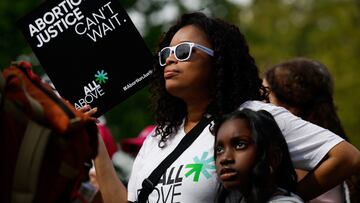ABORTION
When will the Supreme Court rule on Idaho’s abortion ban for medical emergencies?
A new flashpoint in the abortion rights fight is being heard today in the Supreme Court, with potentially national implications.

The Supreme Court heard arguments on April 24, 2024, in a case with national implications for abortion access. At the center lies Idaho’s near-total abortion ban, enacted in 2022, challenged by the Biden administration.
The case, Moyle v. United States, hinges on whether this ban conflicts with a federal law requiring hospitals to provide stabilising care, potentially including abortion, in medical emergencies. Idaho’s law criminalises performing abortions, with a narrow exceptions to save the life of the pregnant woman or in cases cases of rape or incest.
“One hospital system in Idaho says that right now it’s having to transfer pregnant women in medical crisis out of the state about once every other week,” Solicitor General Elizabeth Prelogar said. “That’s untenable and EMTALA does not countenance it.”
The Biden administration argues this violates the Emergency Medical Treatment and Active Labor Act (EMTALA). This federal law mandates hospitals to stabilise patients experiencing medical emergencies, regardless of their ability to pay. The crux of the argument centres on whether EMTALA compels hospitals to provide abortions when necessary to stabilise a woman experiencing pregnancy complications.
What could the outcome mean for future abortion bans?
The outcome of this case could significantly impact abortion access in states with restrictive laws. If the Court rules in favor of the Idaho ban, it could embolden other states to enact similar restrictions, potentially creating a scenario where doctors fear prosecution for providing life-saving care. Conversely, a ruling upholding EMTALA would ensure a baseline of abortion access for medical emergencies, even in states with bans.
“We’ve seen across the country a race from anti-abortion states to pass more and more extreme bans,” Jill Habig, a former legal adviser to Vice President Kamala Harris in the California Attorney General’s office says, “and I think we can expect other states to follow Idaho’s lead if the Supreme Court allows Idaho to trump federal law and women’s health.”
Pro-choice advocates argue that Idaho’s law creates a chilling effect on healthcare providers, leading to delays in critical care. They emphasise the importance of allowing doctors to make medical decisions based on the specific circumstances of each case.
With the court’s conservative majority, the outcome is uncertain. However, the stakes are high. A ruling in favor of Idaho could further restrict abortion access and create a patchwork of healthcare across the country. Conversely, a decision upholding EMTALA could provide a crucial safeguard for women facing life-threatening pregnancy complications, even in states with restrictive abortion laws.
A decision could yet take months.






